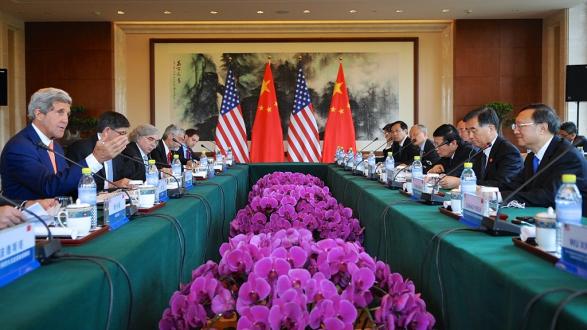The following is an excerpt from a new report by Pacific Council President and CEO Jerrold D. Green, Communications Associate Justin Chapman, and Events Officer Alexandre Moore on the role of public diplomacy in the U.S.-China relationship. The report was presented at the 2016 China-U.S. Diplomacy Summit held at Renmin University in Beijing on June 19, 2016. Read the report in full.
____________________
The United States and China are often at odds. Militarily, the United States is concerned about the modernization and expansion of China’s armed forces and its strategic domain, while China is worried about attempts at strategic containment by the United States and its regional allies. Economically, the United States and China now compete in almost every market. This competition has at times resulted in the two leveling accusations against one another of unfair trade practices and economic espionage. Human rights remain a consistent point of contention between the two, with Washington long ago incorporating the goal of expanding human rights abroad into its foreign policy platform and Beijing adopting the view that human rights should be defined by each country’s unique history and socio-political system.
Despite these areas of disagreement, it is within these very same theaters that the United States and China have overlapping and even interdependent interests. Both governments want to peacefully manage North Korea, to secure access to affordable energy, to guarantee free navigation of the seas, to combat terrorism and contain the spread of violent extremism, to bolster cybersecurity, to promote global development and trade, and to curb climate change, environmental degradation, and pollution. Getting the United States and China to cooperate on these issues will require greater dialogue between ordinary Chinese and Americans, as the policies of our governments will only begin to change once the perceptions of our publics lead the way.
The policies of our governments will only begin to change once the perceptions of our publics lead the way.
Data from a recent Pew Research Center poll found that most Americans and Chinese do not hold favorable views of each other. Just 38 percent of Americans think positively about Chinese, and just 44 percent of Chinese think positively about Americans. However, "young people in both countries express more favorable attitudes of the other nation," according to Pew’s analysis of the survey. Fifty-five percent of American adults under 30 gave China a positive rating, and 59 percent of Chinese adults under 30 gave the United States a positive rating. Interestingly enough, 59 percent of young Chinese also said they "like American ideas about democracy."
Even so, more than half of Chinese respondents said the United States is trying to prevent China from becoming as powerful as the United States. Indeed, as The New York Times recently pointed out, "The Chinese hold contrasting, schizophrenic views of America. For many Chinese people, the depth of their admiration for the American system and way of life is matched only by their animosity toward the country." We can safely assume this is at least partially attributable to the narratives both governments are responsible for espousing.
It is here that the role of public diplomacy comes in as a potentially very powerful force for positive change. Relying on the core elements of public diplomacy – listening, advocacy, cultural diplomacy, exchange, and international broadcasting – both China and the United States can strengthen their vital relationship, avoid confrontation, and chart a way forward that is mutually beneficial.
Los Angeles in particular, a key city that is aware of and values its multifaceted ties to Asia, and home to the Pacific Council on International Policy, is uniquely well positioned to play a central role in this process.
____________________
Dr. Jerrold D. Green is the President and Chief Executive Officer of the Pacific Council on International Policy. Read more about his background.
Justin Chapman is the Communications Associate of the Pacific Council on International Policy. Read more about his background.
Alexandre Moore is the Events Officer of the Pacific Council on International Policy. Read more about his background.




